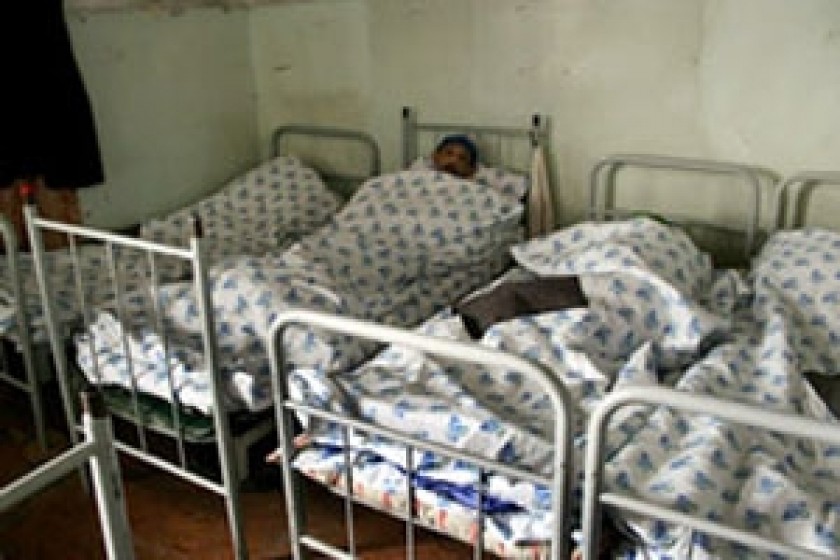
33 Homeless People in a New Shelter
"I was the first one at this institution," said 50-year old Hrant Hovsepyan. The institution in question is a homeless shelter located in one of the buildings of Hostel No. 1. It has been around forty days since Hovsepyan, an immigrant from Baku, last spent his nights in a basement (See also The Best Homeless Person). He was uncertain as to how many days he would spend at the shelter. "One person says two months, others say they are here permanently, I don't know. Where would I go? Back to the same street? Suppose I get a job, and earn my daily bread, but where will I sleep?" After spending seven years on the streets, he preferred not to think of the future. "No, I wouldn't say it's bad, it's good, it's very good," said Hrant, although his room was obviously crowded. There were nine beds lined up in the room, at a maximum distance of one meter from each either. A dog named Boy, brought in by two homeless people, Seryoja and Vika, was living there, too. "It's cramped, but I wouldn't say that it's bad. We live together, arguing one day, being friendly the next. We're all different people, after all," Hrant continued.
Heat, food, baths, medical care, "a roof over our heads" - these were the advantages of the shelter as presented by 64-year old Robert Yeghiazaryan, another roommate from Gyumri. "I am a native of Leninakan, but I left in 1969. We had everything, but the Soviet Union collapsed, and our house came down with it," said the homeless man, still lying in his bed at noon. He was not happy with his health, "I suffer from oedema." He said that when he went to the hospital in Malatia, they asked him for 130,000 drams from him, but where could a homeless man get that kind of money? His daughter is married; she knew where her father was living. Robert Yeghiazaryan said that he had not always slept on the streets. He used to work as a guard and would spend his nights at the guardpost.
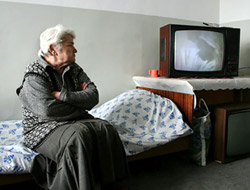 |
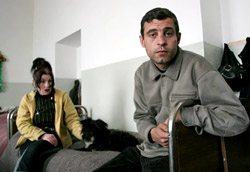 |
| Carmen and Samvel |
There were thirty-three homeless living in three rooms at this hostel in Yerrord Gyugh, while some had been "returned to their families", like Anna, who was expecting a child. And two Kurds had been given permanent residence through the Yerevan office of the United Nations. According to Davit Shahbazyan, director of Hostel No. 1, they had managed to renovate three rooms, with support from Diasporan Armenians, in order to "save the homeless from the cold."
51 million drams (approximately $113,000) had been allocated from the state budget for the construction of homeless shelters. But the results of the tender for the implementation of this project remained unclear. Shahbazyan presumed that the winner would be declared sometime this month, and the construction work would begin in April. Another 38 million drams had been allocated from the state budget to provide food for the homeless and pay the staff that care for them. An amount of 3,400 drams had been calculated per homeless person per day. The shelter was planned for 30 people, but the number of people there crossed that limit further with every passing day. Moreover, only 3 of those 33 were women, but it was as yet impossible to provide them with a separate floor.
35-year old Carmen came to the homeless shelter with her three-month old son, Edmon. But her child was now at the orphanage in Nork. She said that she had handed him over for temporary care, but planned to take him back when conditions improved, i.e. when she got a job and place to stay. She visited her son every Friday. Carmen had been homeless for ten years now. She said that she had been thrown out of her house after disagreements with her foster parents, and she had no news of her husband, who had left for Russia years ago. The room, which had a television set along with all the beds, also included a "women's corner", with make-up and accessories. "Vika and I set it up," said Carmen.
"I think we'll have a wedding here soon," joked the hostel director, alluding to the relationship between Carmen and Samvel, a deportee from Belarus. The latter, however, claimed that he would return to Belarus with his 5-year old son - born of a common-law marriage - as soon as he "got his papers in order". When he was deported from Belarus last August, Samvel Mkrtchyan discovered that he had no place to live - the apartment he used to own in the city of Abovyan no longer belonged to him. Having already forgotten his Armenian, Samvel said that he had been left "hanging in uncertainty", not even knowing which country he was a citizen of, Armenia or Belarus. His parents remained in Belarus, and were unaware of Samvel's current situation. He found a job a few days ago at a car wash. "At least I'll have money for cigarettes," he said. The state budget has not allocated any money to provide the homeless with cigarettes. The hostel strictly forbids not only smoking, but drinking alcohol as well, in a bid to prevent arguments. Law enforcement officials from the Ministry of Internal Affairs keep an eye on the behavior of the homeless, but from a distance, and in plain clothes, so as not to "get to them psychologically".
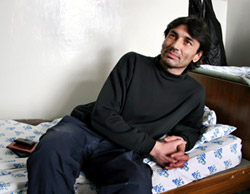 |
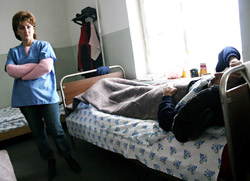 |
| Vasiliy Avramovich | Mikael Ivanovich Gevorgov |
Vasiliy Avramovich, a Serb living at the shelter, had no plans of returning to his homeland. His native village was destroyed during the war in Yugoslavia in 1992, and both his parents died. But there was another reason as well. "I've been in 64 countries, but Armenia is the best," said 40-year old Vasiliy, who was granted Armenian citizenship in 2005. He lived and worked in Norway from 2000 to 2005. "Love brought me to Armenia," he said briefly. He met his future Armenian wife in Moscow, got married and came to Armenia. He then went to Norway and returned to Armenia in 2005. But his wife left him, going to Norway with another man, and leaving their two children, ten-year-old Frunzik and nine-year-old Narek. They live in an apartment in Yerevan that Vasiliy bought, but with their maternal grandmother. Her relationship with Vasiliy was very tense, and they could not live together with the children. Vasiliy said that his children did not even give a passing thought to their father's condition, nor did he want them to know.
Vasiliy also said that he had a nice apartment in Norway and that if he could find a good Armenian lawyer there, he might be able to sell it and buy an apartment in Yerevan. He said that he had worked at Erebuni hospital at one time, but staff reductions meant that he lost his job. He then switched professions from doctor to builder, earning money to eat from work at construction sites during summers. But his source of income dried with the onset of winter. He said that he would like to start working as a doctor again, but that now his own "need for a doctor was greater". What he really needed was a lawyer, but he did not have the money to pay him.
"Ask him why he doesn't eat, he won't tell us anything," said nurse Karine Grigoryan, pointing at one of the homeless men at the shelter. Mikael Ivanovich Gevorgov was brought to the shelter a few days ago by a paramedic team. He refused to say anything about his life, claiming that he "would not speak until his case is heard in the European Court of Human Rights." He would not go into detail regarding the case, saying only that it regarded the "torture of women and children".
"In the month-and-a-half that I've been working with the homeless, I've come to realize that there is a psychological angle to all this," said hostel director Davit Shahbazyan, "We haven't had a case where someone has left and not come back. If they don't return, they tell me beforehand, saying that they feel better about themselves outside."
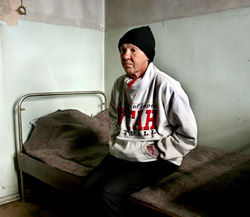 There had been one such case in the previous month-and-a half. The shelter does not currently employ a psychologist, although it was part of the plan to have one. The director said that few would agree to work at Yerrord Gyugh - transport costs alone would be great - for a salary under 30,000 drams. But he hoped to find a solution to this problem in the coming week. The center has employed a lawyer and a pathologist since the day it opened. The homeless are allowed to stay at the shelter only after passing a thorough physical examination. There have been two cases when, after such examinations at a polyclinic, two homeless people were not allowed in the shelter and sent to the tuberculosis hospital instead.
There had been one such case in the previous month-and-a half. The shelter does not currently employ a psychologist, although it was part of the plan to have one. The director said that few would agree to work at Yerrord Gyugh - transport costs alone would be great - for a salary under 30,000 drams. But he hoped to find a solution to this problem in the coming week. The center has employed a lawyer and a pathologist since the day it opened. The homeless are allowed to stay at the shelter only after passing a thorough physical examination. There have been two cases when, after such examinations at a polyclinic, two homeless people were not allowed in the shelter and sent to the tuberculosis hospital instead.
But where will these homeless people be two months from now? The law states that the homeless may stay at temporary shelters for up to two months. Shahbazyan could not answer this question either. "We would probably have to readmit them, because many of them have problems with their documentation that still have not been sorted out," he said.
Karine Asatryan
Photos by Onnik Krikorian
 Videos
Videos Photos
Photos




Write a comment